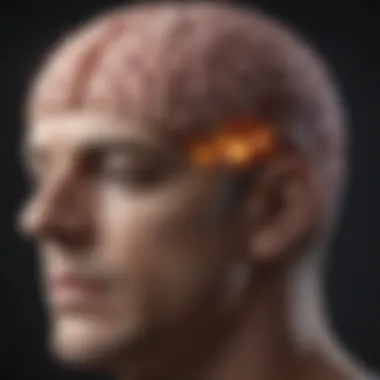Exploring Narcolepsy and Auditory Hallucinations


Intro
Narcolepsy is a chronic sleep disorder that leads to overwhelming daytime drowsiness and sudden attacks of sleep. One of its lesser-known aspects is the occurrence of auditory hallucinations. These auditory experiences can be distressing and confusing. Understanding this connection requires delving into the complexities of narcolepsy itself, as well as the psychological factors that play a role in these hallucinations. This article engages with current research and the personal stories of individuals affected by narcolepsy to provide a deeper comprehension of these intertwined phenomena.
Understanding Mental Health and Well-being
What is Mental Health?
Mental health encompasses emotional, psychological, and social well-being. It affects how we think, feel, and act. It also determines how we manage stress, relate to others, and make choices. An understanding of mental health is crucial, particularly for those dealing with conditions like narcolepsy, which may exacerbate mental health challenges.
The Importance of Prioritizing Mental Well-being
Prioritizing mental well-being is essential for individuals with narcolepsy. Sleep disorders can severely impact one’s mental health, leading to issues such as anxiety and depression. Effective management of mental health can improve overall quality of life.
Common Mental Health Challenges and Disorders
Narcolepsy can coincide with various mental health challenges. Issues like anxiety, mood disorders, and the impact of auditory hallucinations can compound the difficulties faced by individuals living with narcolepsy. Understanding these challenges lays the groundwork for better treatment and support.
Strategies for Improving Mental Health
Self-care Techniques and Practices
Self-care is paramount when managing mental health. Simple practices like maintaining a sleep schedule, engaging in relaxing activities, and avoiding stimulants can help manage narcolepsy.
Building Resilience and Stress Management
Building resilience, or the ability to bounce back from challenges, is vital for those with narcolepsy. Stress management techniques such as breathing exercises, journaling, and physical exercise can provide significant relief.
Seeking Professional Help: Therapy and Counseling
Therapy can be beneficial for individuals dealing with both narcolepsy and mental health issues. Professional help can provide coping strategies and a safe space to discuss experiences.
Finding Balance in Life
Healthy Lifestyle Choices: Diet, Exercise, and Sleep
A balanced lifestyle is crucial. A nutritious diet, regular physical activity, and sufficient sleep can help regulate sleep patterns and enhance overall health.
Mindfulness and Meditation Practices
Practices like mindfulness and meditation can aid in reducing stress and improving mental clarity. These techniques foster a more grounded perspective, which may help those experiencing auditory hallucinations.
Setting Boundaries and Managing Time Effectively
Time management is essential for reducing stress. Establishing clear boundaries can help create a better balance between activities, work, and rest.
Enhancing Personal Development
Goal Setting and Productivity Tips
Setting personal goals can provide direction. Breaking goals into manageable tasks can prevent overwhelm and foster a sense of accomplishment.
Building Healthy Relationships and Social Connections
Healthy relationships are vital for emotional support. Individuals with narcolepsy should seek connections that are understanding and accepting of their condition.
Practicing Gratitude and Positivity
Focusing on positive aspects of life can shift perspective. Daily practices of gratitude can deepene one's outlook and improve mental health.
Tips for Maintaining Mental Well-being
Strategies for Preventing Burnout
People with narcolepsy risk burnout due to the challenges they face. Regular breaks, engaging in enjoyable activities, and understanding one’s limitations can help prevent excessive fatigue.
Coping with Challenges and Setbacks
Coping strategies, such as reaching out for support or practicing self-compassion, can aid in navigating the difficulties that accompany both narcolepsy and mental health issues.
Creating a Supportive Environment


Creating an environment that promotes mental well-being is essential. This includes reducing noise, establishing a calm atmosphere, and ensuring a supportive network of friends and family.
Understanding the relationship between narcolepsy and auditory hallucinations is crucial. Awareness can lead to better coping strategies and improved mental health outcomes.
Prologue to Narcolepsy
Narcolepsy is a sleep disorder that significantly impacts the individuals who live with it. Understanding this disorder is essential as it connects not only to the basic functioning of a person's sleep-wake cycle but also to various psychological and neurological phenomena that can arise as a result. In this article, we will explore narcolepsy's intricacies, particularly its association with auditory hallucinations, often described as hearing voices. This relationship is complex, revealing much about how neurobiology and subjective experience interact.
Definition and Classification
Narcolepsy is typically defined as a neurological condition that disrupts the normal sleep cycle. It is characterized by excessive daytime sleepiness, cataplexy (sudden loss of muscle tone often triggered by strong emotions), and sometimes, a range of nocturnal symptoms. Researchers generally classify narcolepsy into two primary types: narcolepsy type 1, often associated with low levels of hypocretin, and narcolepsy type 2, where hypocretin levels are normal but the symptoms persist. This classification is crucial for diagnosis and guiding treatment.
Furthermore, narcolepsy can be recognized in various ways beyond mere classification. Individuals may experience different combinations of symptoms, which can contribute to understanding how these symptoms overlap with other disorders, like anxiety or schizophrenia.
Prevalence and Impact
The prevalence of narcolepsy is estimated to affect about 1 in 2,000 people worldwide. This statistic, however, may underrepresent the condition's true incidence, as many individuals may go undiagnosed for years due to the often-misunderstood symptoms.
The impact of narcolepsy on daily life is profound. Individuals may face challenges in managing work, education, and relationships due to the uncontrollable nature of their sleep attacks and associated symptoms. The societal implications also require attention. Awareness surrounding narcolepsy is often limited, leading to misunderstandings and stigma, which further complicate the lives of those diagnosed.
"Narcolepsy can severely disrupt a person’s life, affecting their mental health and social interactions."
This introductory exploration serves not only to highlight the disease’s biological mechanisms but also links these aspects to the phenomenon of auditory hallucinations. The next sections will begin to reveal how narcolepsy connects to sensory experiences, bridging science with the personal narratives of those affected.
Neurological Basis of Narcolepsy
Understanding the neurological basis of narcolepsy is critical for comprehending how this condition affects daily life and the specific challenges individuals face. Narcolepsy is not merely a sleep disorder; it is a complex interplay of brain chemistry and physiological processes. This section will explore the underlying causes of narcolepsy, primarily focusing on hypocretin deficiency and the brain structures involved in the sleep-wake regulation.
Hypocretin Deficiency
Hypocretin, also known as orexin, is a neuropeptide that plays an essential role in regulating arousal, wakefulness, and appetite. In individuals with narcolepsy, the deficiency of hypocretin is a significant factor. Studies show that those with narcolepsy type 1 have a dramatic reduction in hypocretin-producing neurons in the hypothalamus, the part of the brain that controls various functions, including sleep.
The absence of hypocretin leads to the disorganization of sleep-wake cycles. Individuals may experience excessive daytime sleepiness and sudden episodes of sleep. Research indicates that this deficiency contributes to the inability to maintain wakefulness. Furthermore, understanding hypocretin deficiency sheds light on other symptoms experienced during narcolepsy episodes, including cataplexy, a sudden loss of muscle tone triggered by strong emotions.
"The role of hypocretin in narcolepsy has brought new insights into our understanding of sleep disorders."
Brain Structures Involved
Several brain structures coordinate the complex system of sleep regulation. Among these, the hypothalamus, thalamus, and brainstem are particularly significant. The hypothalamus regulates hormone release and sleep patterns, while the thalamus acts as a relay station for sensory information and is involved in transitioning between sleep and wake states.
The brainstem also plays a pivotal role by controlling transitions between sleep and alertness. Disruption in these areas can lead to difficulties in maintaining stable sleep-wake cycles, characteristic of narcolepsy.
The involvement of these brain structures highlights why narcolepsy is not simply a sleep disorder; it is intricately tied to various cognitive and emotional processes. Thus, the neurological foundation of narcolepsy is crucial, not only for understanding symptoms but also for developing effective treatments and interventions.
Understanding Auditory Hallucinations
Auditory hallucinations represent a significant phenomenon. They are not limited to auditory stimuli; they express a profound interaction between mental health, neurological disorders, and personal experience. Understanding this complex relationship is crucial, particularly when considering individuals affected by narcolepsy. This condition carries implications for how these hallucinations present and affect a person's life.
The experience of hearing voices can vary widely depending on the individual. It is essential to recognize that not all auditory hallucinations are indicative of mental illness. They can occur in various contexts and disorders, including narcolepsy.
The importance of studying auditory hallucinations includes understanding the broad spectrum of experiences individuals face. Grasping this scope can foster empathy and inform treatment approaches that prioritize mental well-being and recovery.
Definition and Types
Auditory hallucinations are defined as perceptions of sounds in the absence of external stimuli. This can include hearing voices, music, or other noises. These experiences stem from various causes and can present in different forms:
- Voices: These are the most common type, where individuals might hear one or several voices speaking to or about them.
- Music or Sounds: Some may hear music or environmental sounds that are nonexistent.
- Command Hallucinations: These instruct the individual to perform specific actions, which can be concerning, especially if they involve harm.
Understanding these types clarifies the experience of those with narcolepsy who might encounter such phenomena during episodes of excessive daytime sleepiness or during transitions between sleep and wakefulness.
Prevalence in Various Disorders
Auditory hallucinations are not confined to one particular disorder. They surface in various psychiatric and neurological conditions, contributing to diverse clinical presentations. Key disorders associated with auditory hallucinations include:
- Schizophrenia: Often recognized for extensive hallucinations, voices can dominate the individual's mental space.
- Bipolar Disorder: In manic or depressive phases, some individuals may experience auditory issues.
- Narcolepsy: Though less discussed, individuals with narcolepsy can report hearing voices, especially when experiencing sleep attacks or during night terrors.
- Post-Traumatic Stress Disorder (PTSD): Survivors may occasionally hear distressing sounds from past traumas.
Research indicates that 4 to 20 percent of individuals with narcolepsy report auditory hallucinations as a symptom. This highlights the necessity for tailored interventions that consider both the commonality of these experiences and their impact on mental health and daily function.
The presence of auditory hallucinations can significantly influence one's quality of life. Understanding these experiences can lead to more empathetic care and more effective treatments.
The Intersection of Narcolepsy and Hearing Voices
The topic of the intersection between narcolepsy and hearing voices brings critical attention to a complex area of study. This aspect is especially relevant because it unravels how a neurological sleep disorder can manifest through auditory hallucinations. Understanding this connection is pivotal for both the medical community and individuals affected by narcolepsy, as it connects physical and psychological dimensions of health.


Both narcolepsy, characterized by excessive daytime sleepiness and sudden sleep attacks, and auditory hallucinations require careful analysis. A deeper understanding of the intersection between these conditions can foster better diagnosis, treatment, and support for those experiencing them. The significance of this exploration lies not only in scientific inquiry but also in the real-life implications for individuals trying to navigate their experiences.
Mechanisms Linking Narcolepsy and Hallucinations
Research suggests a number of mechanisms that may link narcolepsy with auditory hallucinations. One potential explanation involves the disruption of sleep patterns, particularly during REM sleep. Individuals with narcolepsy often experience altered REM cycles, leading to different brain activity patterns. These altered states may result in vivid dreams or hallucinations, blurring the line between wakefulness and sleep.
Additionally, the deficiency of hypocretin, a neurotransmitter that regulates wakefulness and sleep, plays a crucial role. When hypocretin levels drop, it can lead to a lack of stability in the sleep-wake cycle. This instability can cause the brain to misinterpret sensations, potentially inducing auditory hallucinations. Neuroimaging studies have shown changes in brain activity that correspond with these experiences, highlighting a direct biological connection.
In summary, the mechanisms linking narcolepsy and auditory hallucinations are multifaceted. The interplay of neurobiology and sleep disruption cannot be overlooked in understanding why auditory experiences occur in some narcoleptic individuals.
Personal Accounts and Case Studies
Exploring personal accounts and case studies enriches the understanding of narcolepsy and its intersection with auditory hallucinations. Individual narratives provide insights beyond clinical observations, showcasing the lived experiences of those affected.
For example, some individuals report hearing familiar voices or sounds while transitioning between sleep and wakefulness. This phenomenon highlights the subjective nature of such experiences, revealing both distress and confusion. One case study documents a young adult who faced constant auditory hallucinations resulting in anxiety and clouded thought processes. Such accounts illustrate the profound impact on mental health and daily functioning.
Adhering to a biopsychosocial model, these personal accounts can guide clinicians in tailoring treatment plans. Engaging with the narratives of individuals living with narcolepsy allows for a better appreciation of their challenges, ultimately fostering a more empathetic approach to care.
Through both mechanisms and personal experiences, the relationship between narcolepsy and auditory hallucinations exemplifies a complex interplay. Understanding this intersection helps in highlighting the necessity of comprehensive care, focused on both neurological and psychological dimensions of health.
Psychological Perspectives on Auditory Experiences
Understanding the psychological dimensions of auditory hallucinations is essential. This section investigates how cognitive and emotional factors influence the experiences of individuals with narcolepsy. The importance of this topic lies in the potential to foster better approaches for coping and management. Improving awareness about how psychological variables intersect with narcolepsy can enhance care strategies and public understanding of these complex experiences.
Cognitive Factors
Cognition plays a critical role in how auditory experiences are perceived and interpreted. For those with narcolepsy, cognitive processes can be significantly affected. Research indicates that attention, memory, and perception may be altered in narcoleptic individuals, creating a fertile ground for hallucinations.
- Attention: A narcoleptic’s ability to maintain attention may fluctuate due to excessive daytime sleepiness. This can lead to fragmented awareness and misinterpretation of sounds in the environment, potentially resulting in auditory hallucinations.
- Memory: Memory formation and retrieval can also be disrupted. Individuals may experience difficulty recalling events or conversations, leading them to fill gaps in memory with inferred audio experiences.
- Perception: Distorted perception is common. Auditory stimuli that enter awareness might not be accurately processed, contributing to sensations of hearing voices or sounds that are not present.
Understanding these cognitive factors helps in identifying how narcolepsy can exacerbate auditory experiences. Tailoring interventions that address these elements can be beneficial.
Emotional Impact of Hearing Voices
The emotional ramifications of auditory hallucinations are profound. For many, hearing voices is not only a puzzling experience but can also evoke substantive emotional responses such as fear, confusion, or isolation.
- Fear: When individuals hear criticisms or negative comments directed towards them, it can lead to anxiety and fear of social situations.
- Isolation: Hallucinations can make it hard for individuals to connect with others, as they may feel misunderstood or judged, which increases feelings of loneliness.
- Emotional Discomfort: Experiencing these auditory phenomena often brings about distress. Individuals may struggle with validating their experiences, feeling trapped in a reality that others cannot access.
"Understanding the emotional context of hallucinations is crucial. It allows caregivers to offer tailored support and helps individuals navigate their experiences more effectively."
By acknowledging these emotional impacts, care providers can better assist those affected by narcolepsy and auditory hallucinations. Both cognitive and emotional perspectives provide a comprehensive insight into the profound nature of these auditory experiences, facilitating a more empathetic and informed response from both medical professionals and society at large.
Diagnosis and Differentiation
The process of diagnosing narcolepsy, particularly in the context of auditory hallucinations, is critical. Correct diagnosis is fundamental for effective treatment. Narcolepsy is often misdiagnosed or undiagnosed because its symptoms can mimic those of other conditions. Differentiating narcolepsy from other sleep disorders is essential for providing appropriate intervention and support.
Individuals with narcolepsy may experience a range of symptoms that overlap with other psychological conditions, which might complicate their diagnosis. Therefore, understanding how narcolepsy presents itself is vital for healthcare providers.
Some benefits of accurate diagnosis include improved treatment outcomes and enhanced quality of life. Positive results come from identifying the correct condition early, which allows for timely management strategies. Considering the emotional and cognitive effects of narcolepsy, differentiating it from disorders like schizophrenia or depression is not just helpful; it is necessary.
Accurate diagnosis leads to targeted therapy, benefiting those affected directly and indirectly.
Diagnostic Criteria for Narcolepsy
The diagnostic criteria for narcolepsy have evolved. The International Classification of Sleep Disorders provides guidelines for diagnosing narcolepsy. Key elements include:
- Excessive Daytime Sleepiness (EDS): This is often the most prominent symptom. Patients often have an uncontrollable urge to sleep during the day.
- Cataplexy: Sudden loss of muscle tone can lead to temporary weakness, which may be triggered by strong emotions. This symptom is particularly indicative of narcolepsy.
- Rapid Eye Movement (REM) Sleep Dysregulation: Disturbed sleep patterns may include REM sleep occurring sooner than usual. This contributes to the perception of hallucinations.
Additional tests, including a Polysomnography (PSG) and a Multiple Sleep Latency Test (MSLT), may be used to confirm diagnosis. These tests help assess sleep cycles and identify abnormalities that could be related to narcolepsy.
Distinguishing Symptoms from Other Disorders
Understanding the symptoms of narcolepsy in contrast with other disorders can be complex. Key distinguishing factors include:
- Hearing Voices: While auditory hallucinations can occur in narcolepsy, they also appear in psychiatric disorders, such as schizophrenia. The context and accompanying symptoms differ significantly.
- Mood Fluctuations: Depression and anxiety often co-occur with narcolepsy. However, if sleep disturbances are primary, narcolepsy might be the better diagnosis.
- Physical Manifestations: Observing symptoms like cataplexy is specific to narcolepsy. Other sleep disorders do not typically include sudden muscle weakness triggered by emotions.
Proper assessment of symptoms is essential. Clinicians need a thorough patient history and may involve family members in the evaluation process.
In summary, effective differentiation helps in steering individuals towards the most suitable interventions, enhancing their overall well-being.
Treatment Approaches for Narcolepsy
Treatment approaches for narcolepsy are crucial in managing the symptoms and improving the quality of life for those affected. Narcolepsy can significantly disrupt daily functioning, and finding effective treatment options is essential for both individuals and their families. This section explores the medications available, management strategies, and the integration of psychological support into treatment plans.


Medications and Management Strategies
Medications play a vital role in the treatment of narcolepsy. They aim to alleviate excessive daytime sleepiness and help manage other symptoms, such as cataplexy. Here are some commonly used medications:
- Stimulants: Modafinil and armodafinil are primary choices. They promote wakefulness and are generally well tolerated.
- Sodium Oxybate: This medication is significant in treating both excessive daytime sleepiness and cataplexy. It works by stabilizing sleep patterns.
- Antidepressants: Certain antidepressants can help manage cataplexy and other REM-associated symptoms.
Management strategies also include lifestyle modifications. Maintaining a consistent sleep schedule can help regulate sleep patterns. Incorporating scheduled naps can combat daytime sleepiness. Creating a sleep-friendly environment with minimal distractions can also improve sleep quality.
Psychological Support and Therapy
Psychological support is an essential aspect of managing narcolepsy. Individuals may experience anxiety, depression, or social isolation, resulting from their condition. Therapeutic approaches can enhance coping mechanisms and improve overall well-being.
- Cognitive Behavioral Therapy (CBT): This therapy helps address distorted thinking patterns and builds coping strategies.
- Support Groups: Connecting with others facing similar challenges can provide emotional support and practical advice.
Incorporating psychological support not only aids in coping with symptoms but also promotes mental health, which can positively affect the management of narcolepsy.
Research shows that those who receive comprehensive care, which includes both medications and psychological support, report better outcomes in managing narcolepsy than those who rely solely on medication.
Overall, a multidisciplinary approach combining medications, lifestyle adjustments, and psychological therapy is recommended. This holistic strategy aims to provide the most effective management of narcolepsy, allowing individuals to lead fulfilling lives despite their condition.
The Role of Research in Navigating Narcolepsy
Research plays a crucial role in understanding narcolepsy and its complex relationship with auditory hallucinations. By focusing on specific mechanisms and interactions within the brain, researchers are advancing our knowledge. This is vital not only for comprehending the nuances of narcolepsy but also for developing effective treatment options. The implications of ongoing studies extend to areas such as diagnosis, therapeutic interventions, and improving patient quality of life.
Current Research Trends
Recent studies have highlighted several key areas of focus in narcolepsy research:
- Neurobiological Studies: Ongoing investigations into the neurobiological underpinnings, including sleep-wake cycles affected by hypocretin deficiency. Researchers are particularly interested in understanding how this deficiency contributes to both sleep episodes and auditory hallucinations.
- Psychological Assessments: There is a growing trend to understand the psychological aspects tied to narcolepsy. Studies examine the emotional and cognitive factors that might influence the experience of auditory hallucinations.
- Clinical Trials: New interventions, including various medications, are being tested for their efficacy in managing narcolepsy and related symptoms. Utilizing advanced technology like neuroimaging has allowed researchers to observe brain activity during episodes, shedding light on auditory experiences.
"Research not only fosters understanding but also supports advancements in treatment paradigms for complex conditions like narcolepsy."
Future Directions for Study
Looking ahead, several avenues seem promising for future research on narcolepsy:
- Integrative Approaches: Combining neurobiology with psychology to explore how different domains interact in the manifestation of auditory hallucinations related to narcolepsy. Understanding these intersections could lead to more personalized treatment options.
- Longitudinal Studies: Conducting long-term studies to monitor the progression of symptoms and evaluate long-term treatment effects. Observing individuals over extended periods may offer deeper insights.
- Technological Innovations: Advancements in technology may provide new ways to measure and analyze sleep patterns and hallucinations. Employing wearable technology or mobile apps to track daily experiences could enhance data transparency.
Living with Narcolepsy and Hearing Voices
Living with narcolepsy can be a complex journey, especially when accompanied by auditory hallucinations. It is important to recognize how these experiences can impact daily life. Individuals living with narcolepsy often face unique challenges that can shape their mental health and overall well-being. Understanding coping strategies and finding support systems play a critical role in effectively managing symptoms and improving quality of life.
Coping Strategies
Developing effective coping strategies is essential for navigating life with narcolepsy and auditory hallucinations. Many individuals find relief through various techniques that help them manage both the physical and psychological aspects of their condition.
- Sleep Hygiene: Establishing a consistent sleep routine can minimize excessive daytime sleepiness. Going to bed and waking up at the same time daily creates a structured environment.
- Mindfulness and Meditation: Techniques like mindfulness meditation can help in reducing anxiety and stress that may arise from hallucinations. Practicing mindfulness allows individuals to remain grounded during episodes.
- Limiting Stimulants: Reducing intake of caffeine and nicotine may help improve sleep quality. Stimulants can interfere with the sleep cycle, exacerbating narcolepsy symptoms.
- Physical Activity: Engaging in regular exercise provides physical and mental benefits. Activities like yoga or walking can enhance mood and energy levels.
- Journaling: Keeping a journal can serve as a tool for self-reflection. Writing down thoughts and feelings can help individuals process their experiences and notice patterns over time.
These strategies may not be universally effective, but they can provide a starting point for individuals seeking ways to cope with their experiences.
Support Systems and Resources
Having a strong support system is vital for those living with narcolepsy and auditory hallucinations. Connecting with others who understand their struggles can foster a sense of belonging and validation.
- Support Groups: Local or online support groups on platforms like Reddit or Facebook offer spaces for sharing experiences. These groups provide community and understanding, reducing feelings of isolation.
- Mental Health Professionals: Seeking help from psychologists or counselors who specialize in sleep disorders can bring valuable insights. Therapy can offer coping mechanisms tailored to individual needs.
- Educational Resources: Websites like Wikipedia and Britannica provide reliable information about narcolepsy and auditory hallucinations. Staying informed can empower individuals through knowledge.
- Family and Friends: Communicating with loved ones is important. Sharing concerns and experiences fosters support, encouraging positive interactions.
Building a network of support can significantly improve quality of life for individuals struggling with narcolepsy.
Living with narcolepsy and experiencing auditory hallucinations require understanding and adaptation. By implementing coping strategies and fostering support systems, individuals can navigate their realities with greater resilience.
End
The conclusion of this article is critical in weaving together the numerous insights presented throughout. Narcolepsy and its connection to auditory hallucinations represent a complex interaction that warrants deeper understanding. By examining the neurological foundations, psychological implications, and lived experiences of individuals, this article provides a thorough overview of the subject. The intertwining of sleep disorders and auditory phenomena can reveal crucial insights into both conditions.
Summarizing key points throughout the article offers clarity to the reader. Understanding the mechanisms behind narcolepsy and auditory experiences can aid in recognizing symptoms and fostering empathy. As awareness increases, it becomes evident that informed perspectives enable better support systems for those enduring these challenges.
Moreover, promoting awareness around narcolepsy and its associated hallucinations can reduce stigma. Knowledge is powerful; it allows individuals and communities to approach mental health issues with compassion. Ultimately, a well-rounded comprehension of these subjects empowers both educators and mental health practitioners, allowing them to better assist those affected.
"Awareness and understanding are the first steps towards destigmatizing conditions like narcolepsy and auditory hallucinations."
Summary of Key Points
- Narcolepsy is characterized by excessive daytime sleepiness and can lead to disturbances such as auditory hallucinations.
- The link between narcolepsy and auditory experiences often involves brain mechanisms that overlap between sleep and wakefulness.
- Personal accounts of those experiencing narcolepsy illustrate the diverse ways auditory hallucinations can manifest.
- Psychological factors, including emotional states and cognitive processes, can influence the perception of these hallucinations.
- Treatment approaches integrating both medical and psychological support are essential for managing symptoms effectively.
The Importance of Awareness and Understanding
Awareness of narcolepsy and auditory hallucinations is essential for various reasons. First, it prompts dialogue about the significance of sleep health in overall well-being. Second, understanding these connections helps dismantle prejudices faced by individuals with such disorders. Shifting perceptions can enhance support networks, leading to improved mental health outcomes.
Additionally, informed communities can foster an environment where individuals feel comfortable seeking help. Public discourse around these topics contributes to challenging misconceptions. Furthermore, fostering greater empathy allows those affected to feel validated in their experiences. In an era where mental health conversations are gaining traction, understanding conditions like narcolepsy is more important than ever.















